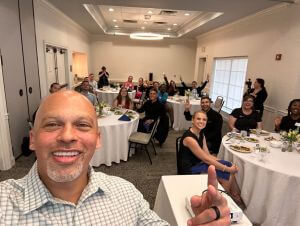
Enhance Your Personal Brand Through Strategic Social Media Content
In the digital age, there's no better platform to establish and grow your personal brand than social media. With its global reach and interactive nature, social media allows you to showcase your expertise, engage with your audience, and make a memorable impression.
Last month, I spoke to the Young L eaders Alliance about how to grow their own Personal Brands.
eaders Alliance about how to grow their own Personal Brands.
Let's explore the types of content you can distribute on social media to amplify your personal brand.
The Power of Authenticity
Authenticity, at its core, means staying true to who you are, what you do, and whom you serve. It's about aligning your actions with your beliefs and values. In the context of personal branding, authenticity means presenting yourself honestly. It involves showcasing your genuine personality, sharing your real experiences, and voicing your own ideas.
Building Trust: Authenticity fosters trust, a critical element in professional relationships. When you're open and authentic, people feel they know the 'real' you, which makes them more likely to trust you. This trust can lead to stronger connections, more opportunities, and long-term loyalty.
Creating Differentiation: Authenticity helps differentiate you from others. Everyone has unique experiences, perspectives, and skills. By being authentic, you highlight what makes you different and why that difference is valuable.
Fostering Connection: People connect with people, not polished corporate personas. By showing your human side - including your passions, struggles, and triumphs - you allow others to identify with you. This can foster deeper connections and open up opportunities for collaboration.
Be Consistent: Authenticity also means being consistent across different platforms and interactions. Ensure that your online persona reflects how you are in real life, and vice versa.
Show Vulnerability: It’s okay to admit that you don't know everything or that you've made mistakes. Showing vulnerability isn't a sign of weakness; it's a testament to your authenticity.
Educational Content
Sharing knowledge is one of the most effective ways to establish yourself as an authority in your field. You could write blog posts explaining complex industry concepts, create how-to videos, or share informative infographics. For example, a professional chef might post a video tutorial on how to prepare a gourmet dish, while a marketing expert could share a blog post about the latest SEO strategies.
Thought Leadership Content
Thought leadership content positions you as a forward-thinker in your industry. This can include sharing your unique insights on industry trends, voicing your opinion on relevant issues, or predicting future developments. For instance, a tech entrepreneur could write an article about the future of artificial intelligence, while a sustainability advocate might share their thoughts on emerging green technologies.
Personal Stories and Experiences
Authenticity is key to personal branding. Sharing your personal stories and experiences not only makes you relatable but also helps to convey your values and personality. You could talk about the challenges you've overcome, the lessons you've learned, or the milestones you've achieved. For example, a startup founder could share their journey of building a company from scratch, including the highs, the lows, and everything in between.
Celebrating Colleagues: A Powerful Personal Branding Strategy
One often overlooked aspect of personal branding on social media is the power of celebrating and highlighting your colleagues. By showcasing the people you work with, you not only strengthen your professional relationships but also enhance your own reputation as a team player and leader.
The Power of Tagging
A simple yet effective way to highlight colleagues is by sharing photos or posts that feature them and tagging them. For example, if you're working on a project together, you could post a snapshot of a brainstorming session and tag your teammates. This not only gives them recognition but also gives your audience a glimpse into your collaborative work environment.
Tagging colleagues in relevant posts can also encourage your network to connect with them, fostering a sense of community. It's a win-win situation: your colleagues get additional exposure, and your network gets the opportunity to connect with other professionals in your field.
Giving Shout-outs
Don't hesitate to give shout-outs to your colleagues for their achievements or contributions. Whether they've just landed a big client, delivered an impressive presentation, or celebrated a work anniversary, acknowledging their accomplishments publicly shows that you value their work and are proud to be associated with them.
Remember to be genuine in your praise, and provide context so that your audience understands the significance of the achievement. For example, "A huge shout-out to @colleague's name for landing our biggest client this quarter! Your dedication and negotiation skills are truly inspiring."
Sharing Their Content
Another way to highlight your colleagues is by sharing their content. If they've written a thought-provoking article, shared an insightful post, or been featured in a podcast, spread the word. Not only does this provide valuable content to your audience, but it also positions your colleagues as experts in their field.
User-Generated Content
User-generated content (UGC) can help build trust and foster community. Encourage your followers to share their own experiences related to your field, and repost their content with their permission. For example, a fitness trainer could start a hashtag challenge where followers post pictures of their workout routines.
Interactive Content
Engaging your audience is crucial for building a strong personal brand. Interactive content such as polls, quizzes, Q&A sessions, or live videos can encourage audience participation and foster a sense of community. For example, a digital marketing professional could host a live Q&A session on Instagram where they answer questions about social media strategies.
Behind-the-Scenes Content
Showing what goes on behind the scenes can humanize your brand and make you more relatable. This could include a day in your life, sneak peeks into your work process, or team introductions if applicable. For instance, an artist could share a time-lapse video of their painting process, while a consultant could give a tour of their home office.
The content you share on social media can significantly impact your personal brand. The key is to be consistent, authentic, and strategic with your content. Remember, your goal is not just to showcase your expertise, but also to engage with your audience, convey your values, and make a lasting impression. So start crafting your social media content strategy today, and watch your personal brand flourish.
Presented By:

